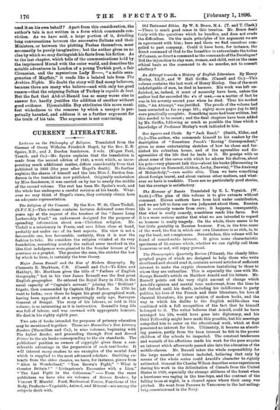The Phonographic Quarterly Review (Pitman), the clearly litho- graphed pages
of which are designed to help those who write shorthand and should read it, contains several articles of sufficient interest to make the cryptic characters tantalising to those to whom they are unfamiliar. This is especially the case with Mr. George Russell's article on Matthew Arnold and his letters. Mr. Russell points out the very slight amount of change which Arnold's opinion and mental tone underwent, from the time he left Oxford until his death, including his indifference to party politics, his love of the French and their literature, his love of classical literature, his poor opinion of modern books, and the way in which his dislike to the English middle-class was combined with a full recognition of the fact that he himself belonged to it. The writer believes that Arnold, could he have arranged his life, would have gone into diplomacy, and his Oriel Fellowship might have made this possible, but his marriage compelled him to enter on the educational work, which at first possessed no interest for him. Ultimately, it became an absorb- ing passion, partly from the keen interest he felt in the poorer children of the schools he inspected. The constant tenderness and warmth of his affections made his work for the poor acquire an interest which afterwards passed also into the education of the middle-classes. Mr. Russell takes the whole responsibility for the large number of letters included, believing that only by means of the whole series could Arnold's character be rightly estimated. General Sir Charles Wilson describes some experiences during his work in the delimitation of Canada from the United States in 1858, especially the strange stillness of the forest when a hurricane was raging in the tree-tops, and the contrast of the falling trees at night, in a cleared space where their camp was pitched. He went from Panama to Vancouver in the last sailing- brig commissioned in the Navy.






































 Previous page
Previous page